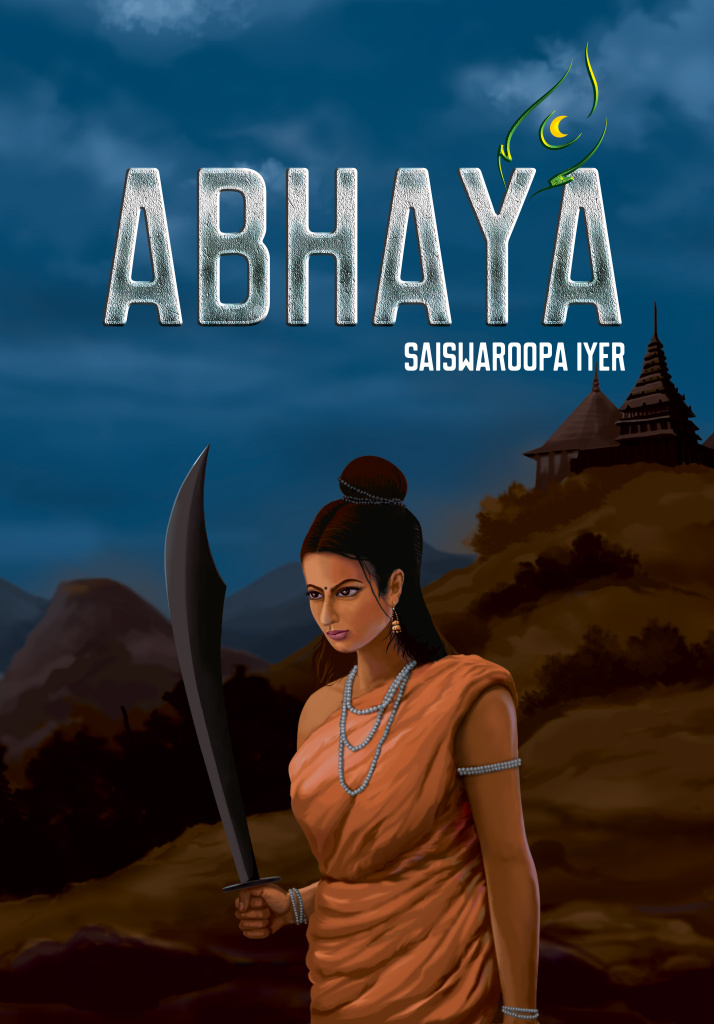It is not often that we come across a book on mytho-fantasy/itihaas-purana genre with a strong female protagonist (other than Sita and Draupadi). In light of that, Abhaya by Saiswaroopa Iyer was always on my reading list the moment I came to know of it.
Synopsis:
Abhaya is a brave princess of Anagha, a fictional kingdom situated on the Western frontiers of Bharatvarsha. Feisty, fearless and with a natural propensity for fighting and administration, she can even give up her life, if the need be, for the sake of her land or to uphold Dharma. Her courage is tested soon enough as their kingdom suffers attacks from neighbouring rulers and gets embroiled in unexpected battles.
Far away, in the Eastern parts of the subcontinent, another woman named Dhatri is rescued by King Bhauma from a violent mob who wish to kill her and her lover in the name of honour. She escapes from near death and reaches the peaceful temple-town of Kamarupa. Indebted to the King and bereft of any family, she embraces the Shakta way of life and becomes a devotee of Devi Kamakshya.
However, unknown to both women, a serious conspiracy is brewing in Bharatvarsha that would soon bring them face to face. As Abhaya battles one adversary after another with her friend, philosopher, guide Vasudeva Krishna (who is also the love of her life), she finds herself sucked into a bigger crisis that makes her question everything she has ever believed in. What begins as an ideological difference turns out to be something far more menacing as at the heart of this conflict lies greed, lust, misogyny, religious bigotry and politics — not very different from our present day society.
How do the women cope with the impending doom that looms over their own future, as well as that of Bharatvarsha? Read Abhaya to find out…
What I Iiked:
The plot is absolutely riveting. Iyer has done an excellent job of extrapolating from the well-known tale of Narkasura, and intertwined it masterfully with the story of Kamakshya Devi. The fictional world of Anagha has been crafted well, and the story remains engaging with unexpected twists till the very end. One might feel a bit lost in the initial chapters as the plot moves to and fro between Anagha and Kamrupa, but the author connects the dots and ties all loose ends slowly and beautifully as the story progresses, all culminating to a satisfying closure.
The book gives us a plethora of wonderful female characters, like Shyeni, Kadambari, etc who drive the narrative alongside the protagonists. The character of Dhatri, particularly, is well-crafted. Long, thoughtful discourses on social issues dominate the narrative in various places through which various characters reflect upon patriarchy, misogyny, etc that are prevalent even today. In fact, one of the most unique aspects of the novel is the questions it raises on the importance of conscience, morality and, the impact that ideological differences can have on the society.
What Could Have Been Better:
Barring the editing errors and typos, there were three areas, where I felt Abhaya could have been more effective.
First, the language. It is good enough no doubt, but mostly functional by nature, lacking the flamboyancy one would generally expect from historical or mythological epic sagas. Second, in places, we can find hints of anachronism. For example, Subhadra and Abhaya share views akin to modern-day feminism and women empowerment, which may have been very unlikely for women of Mahabharata era to perceive. (Having said that, I would give the author a benefit of doubt here, as this might have been a deliberate choice on her part to address contemporary social issues.) Last – but the most important, perhaps – is the overtly idealistic character sketch of the protagonists. Abhaya is extremely likeable to the point of being unerringly flawless. Same goes for Krishna as well as almost every other character who are on the ‘good’ side of the war. I wish the characters exhibited a little bit of imperfection, inadequacy and grey shade to add to the depth, and look more raw and real. After all, they are all made of flesh and blood!
However, these are mostly subjective errors, and thus their importance rests greatly on the perspective of the individual reader. In light of that, we may even overlook these glitches, especially, since this is Iyer’s first book.
Overall Verdict:
If you are someone who naturally gravitates to stories with badass female protagonists, then this book is a must read. 4 out of 5 stars from my end.
Image Courtesy: Goodreads
